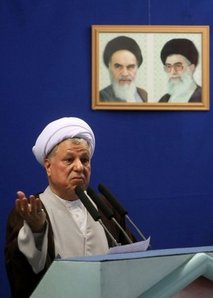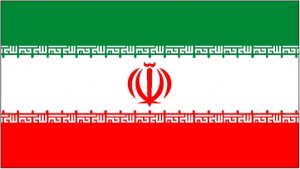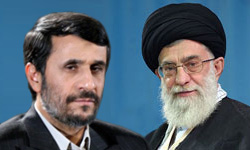The Latest from Iran (19 March): Untamed?
 Friday, March 19, 2010 at 15:27
Friday, March 19, 2010 at 15:27  2120 GMT: Mahmoud Goes to the Country? OK, it's not just Internet chatter. EA readers bring me up to speed: in a televised statement on Friday night, President Ahmadinejad set out the possibility of a referendum on his proposal to control $40 billion from subsidy reductions (the Parliament only gave him $20 billion).
2120 GMT: Mahmoud Goes to the Country? OK, it's not just Internet chatter. EA readers bring me up to speed: in a televised statement on Friday night, President Ahmadinejad set out the possibility of a referendum on his proposal to control $40 billion from subsidy reductions (the Parliament only gave him $20 billion).And Ahmadinejad wasn't pulling punches: he said that his "conservative" opponents in Parliament were verging on "treason" with exaggerated statements of the inflationary potential of his plan. Fortunately, he reassured, their economic estimates were not correct.
NEW Iran: Ethnic Minorities and the Green Movement (Ghajar)
NEW Iran Academic Question: Suspending North American Studies?
Latest Iran Video: Mousavi’s and Rahnavard’s New Year Messages (18 March)
Iran: Reading Mousavi & Karroubi “The Fight Will Continue” (Shahryar)
Iran & the US: The Missed Nuclear Deal (Slavin)
The Latest from Iran (18 March): Uranium Distractions
2110 GMT: Containing the Poet. Another story to pick up --- National Public Radio has a profile of 82-year-old Simin Behbahani, the poet who is so dangerous that Iranian authorities seized her passport as she was about to board a flight for an awards ceremony in Paris.
2100 GMT: Back from a movie break. (Iran as Wonderland? Discuss.) Little happening this evening, though there is Internet chatter that Ahmadinejad may go to the country for a referendum on his subsidy reform proposals.
The break is useful to pick up on a couple of important stories. Persian2English has posted an English translation of the Committee on Human Rights Reporters statement of 17 March, responding to the regime's efforts to break human rights activists with charges of their role in US-backed "cyber-warfare":
Exaggerated claims that human rights activists are connected to foreign or political organizations have been repeatedly disseminated by Tehran’s prosecutor, domestic and military media, intelligence interrogators, and internet bandits. No plausible or credible evidence has been introduced to back their accusations of blatant lies....
The Committee of Human Rights Reporters has indicated in their mission statement, in interviews, and in their official announcements that their activities are limited to human rights issues, and they are proud of their work.
1615 GMT: And Via Satellite. European Union ambassadors have declared in Brussels that the EU is determined to end Iran's "unacceptable" jamming of satellite broadcasting and Internet censorship: "The EU calls on the Iranian authorities to stop the jamming of satellite broadcasting and Internet censorship and to put an end to this electronic interference immediately."
1520 GMT: Internet Diplomacy? Secretary of State Hillary Clinton, in an interview with Bloomberg, has highlighted the US Government's support of initiatives to get around Iranian restrictions on Internet access.
Clinton declared, “We’re doing a lot, let me just put it at that, because we think it is in the interests of American values and American strategic concerns to make sure that people have a chance to know what is going on outside of Iran." She claimed that a license had been issued to an (unnamed) company to boost access. Clinton added:
I’m sure that the Iranian authorities will do what they can to block any move that we make, so it’s like a chess game. We’ll go back and make another move, because we think we owe it to the Iranians, particularly during this period when there is so much at stake
1430 GMT: The President and the Clerics. An EA reader brings up to speed on the Ahmadinejad visit to Qom: Khabar Online has pictures of the President with Ayatollahs Mesbah Yazdi, Nouri-Hamedani and Jafar Sobhani, as well as a group shot.
Ahmadinejad's deputy for religious affairs claims that the meeting's atmosphere was good with the President "convincingly" answering some complaints from the clerics. The marjas brought up the people’s income problems, which should be solved, and cultural matters. AN promised to deal with these and also to transform Qom into the most beautiful town of the country.
Another meeting is planned with Jame’eye Modarressin (Association of the Teachers and Researchers of Qom).
1230 GMT: Political Prisoner Watch. Human Rights Activists in Iran have issued a list of 2560 detainees for the Iranian Year 1388 (March 2009-March 2010). The large majority were arrested after the election.
0855 GMT: Political Prisoner Watch. Philosophy student Ali Moazzami has been released on bail; however, other detainees such as journalist Emadeddin Baghi remain behind bars for Nowruz.
0845 GMT: Remembering. Mourners gathered yesterday at the graves of post-election martyrs, placing flowers and cards.
In front of Evin Prison, relatives gathered to demand the release of detainees, including Ms Elham Ahsani, supporter of the Mothers of Mourning.
0825 GMT: Rafsanjani Watch. Here's the Rumour of the Day --- Islamic Republic News Agency claims Hashemi Rafsanjani flew to Kish Island to meet his son Mehdi Hashemi, who wants to return illegally to mainland Iran via Dubai.
AFP picks up on the news, which we reported last night, that Hossein Marashi, a relative of Rafsanjani's wife and an ally of the former President, has been jailed for one year for "spreading propaganda".
0820 GMT: Economy Watch. Jahangir Amuzegar offers a broad analysis of the state of Iran's economy and the problems it poses for President Ahmadinejad.
0815 GMT: Qom Absentee. Looks like one person who was not at the President's meetings with senior clerics (see 0645 GMT) was Ahmadinejad's Chief of Staff Esfandiar Rahim-Mashai. Khabar Online, unsurprisingly, surmises that this is because the President was firmly told to leave Rahim-Mashai behind.
0755 GMT: On the International Front. Lots of media attention to apparent tensions in Moscow between Secretary of State Hillary Clinton and her Russian hosts over Iran. The immediate focus is on whether Russia will finally help Tehran to bring the Bushehr nuclear power plant on-line (Helpful Hint: the Russians are playing a double game, trying to delay completion while publicly declaring that they will ensure Bushehr will start operations in 2010).
The wider issue --- overlooked in The New York Times summary --- is whether Russia will give public backing to an expanded sanctions programme. The dispute in Moscow moves the arrow towards "No".
0745 GMT: Taming the Internet? The New York Times highlights the ongoing battle of the opposition for access to and dissemination of information with "Iran’s Opposition Seeks More Help in Cyberwar With Government". The article highlights both the steps forward and the sizeable challenge that remains. The take-away quote from Mehdi Yahyanejad of the Persian-language news portal Balatarin:
The Islamic Republic is very efficient in limiting people’s access to these sources, and Iranian people need major help. We need some 50 percent of people to be able to access independent news sources other than the state-controlled media.
0730 GMT: Pick Your Analysis. In sharp contrast to the analyses of other "Western" observers, Scott Peterson of the Christian Science Monitor asks, "Does Iran’s most powerful man – whose official title is God’s Deputy on Earth, infallible to his ardent followers – think he is winning?"
Caution is needed here as well. Peterson's supporting evidence of "several close observers" is primarily two unnamed Iranian academics, and some of their declarations are sweeping:
[The Supreme Leader is] in triumphant mood right now. But deep down, he knows he’s lost the war of legitimacy and popularity....Deep inside –-- this is my belief –-- he does not have a very good sleep at night. He’s very angry –-- that’s what I can see in his face. The slogans they leveled against him, the image he’s got –-- he’s lost a lot of the popularity he had.
More useful may be assessments which don't rely on speculating inside Khamenei's head:
It’s almost like one voice coming out of the establishment, state-run television, all their hard-line newspapers, saying that "we managed to crush them”
At the same time, worries are clear to see. They are not in a state of panic [as] in the past, but are still on very high alert. They feel that enemies are organizing, and reformers are just pawns.
0645 GMT: We start the morning clearing away the underbrush of distorted or wayward analyses of Iran's internal situation.
Flynt and Hillary Mann Leverett have written another hit piece, with weakly-supported polemic posing as analysis, claiming the death of the Green Movement.
Far more seriously (since I am not sure key circles in Washington are still paying attention to the Leveretts' repetitions), Najmeh Bozorgmehr of the Financial Times, who has been a quality front-line journalist in Iran, has carried out an examination of the opposition which gets muddled in editing. Bozorgmehr's evaluation is sharp and incisive in places, such as "The Green Movement’s leaders have changed course, publicly urging followers to stop mass demonstrations, to avoid bloodshed and to win support of other social groups, notably lower-income people." She adds, "Iranian analysts and western diplomats doubt if the regime has snuffed out the challenge of the opposition."
However, Bozorgmehr also has some loose, unsupported sentences, "Reformists concede that the intensifying radicalism of demonstrations helped Mr Ahmadinejad to shore up support." And the headlines are caricatures: the Financial Times goes for "Iran's Regime Contains Opposition", while the Irish Times creates, "Hard Line Seems to Have Tamed Iran's Green Movement".
Elsewhere, others have not been tamed. Journalist and activist Isa Saharkhiz, who has been detained for eight months, has told his family that he went on hunger strike Thursday morning and that other prisoners in Section 350 of Evin Prison will join him to protest illegal detention and inhumane conditions.
And President Ahmadinejad has tried to carry out his own taming by visiting senior clerics in Qom. The Financial Times reports that Ahmadinejad met six marja but gives no details beyond that. There is only the cryptic sentence from an analyst, "A massive lobby by the most influential authorities happened to convince the clergy to see the president."
That just raises another question: which "most influential authorities"? We are monitoring.
 Association of Teachers and Researchers of Qom,
Association of Teachers and Researchers of Qom,  Ayatollah Ali Khamenei,
Ayatollah Ali Khamenei,  Ayatollah Jafar Sobhani,
Ayatollah Jafar Sobhani,  Ayatollah Mesbah Yazdi,
Ayatollah Mesbah Yazdi,  Ayatollah Nouri-Hamedani,
Ayatollah Nouri-Hamedani,  Balatarin,
Balatarin,  Christian Science Monitor,
Christian Science Monitor,  Committee on Human Rights Reporters,
Committee on Human Rights Reporters,  Elham Ahsani,
Elham Ahsani,  Esfandiar Rahim-Mashai,
Esfandiar Rahim-Mashai,  Evin Prison,
Evin Prison,  Financial Times,
Financial Times,  Flynt Leverett,
Flynt Leverett,  Hashemi Rafsanjani,
Hashemi Rafsanjani,  Hillary Clinton,
Hillary Clinton,  Hillary Mann Leverett,
Hillary Mann Leverett,  Hossein Mar'ashi,
Hossein Mar'ashi,  Human Rights Activists in Iran,
Human Rights Activists in Iran,  Iran,
Iran,  Iran Elections 2009,
Iran Elections 2009,  Isa Saharkhiz,
Isa Saharkhiz,  Islamic Republic News Agency,
Islamic Republic News Agency,  Jahangir Amuzegar,
Jahangir Amuzegar,  Khabar Online,
Khabar Online,  Mahmoud Ahmadinejad,
Mahmoud Ahmadinejad,  Mehdi Hashemi,
Mehdi Hashemi,  Mehdi Yahyanejad,
Mehdi Yahyanejad,  Mothers of Mourning,
Mothers of Mourning,  Najmeh Bozorgmehr,
Najmeh Bozorgmehr,  National Public Radio,
National Public Radio,  New York Times,
New York Times,  Persian2English,
Persian2English,  Russia,
Russia,  Scott Peterson,
Scott Peterson,  Simin Behbahani in
Simin Behbahani in  Middle East & Iran
Middle East & Iran 



